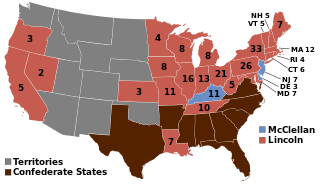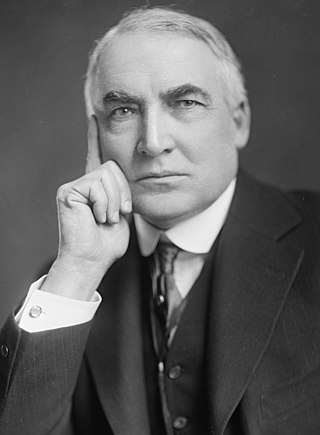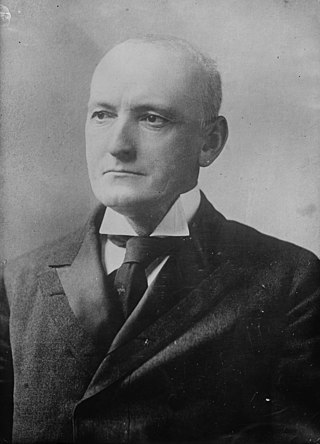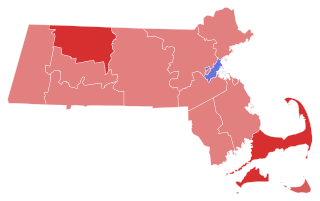
The 1864 United States presidential election was the 20th quadrennial presidential election. It was held on Tuesday, November 8, 1864. Near the end of the American Civil War, incumbent President Abraham Lincoln of the National Union Party easily defeated the Democratic nominee, former General George B. McClellan, by a wide margin of 212–21 in the electoral college, with 55% of the popular vote. For the election, the Republican Party and some Democrats created the National Union Party, especially to attract War Democrats.

The 1920 United States presidential election was the 34th quadrennial presidential election, held on Tuesday, November 2, 1920. In the first election held after the end of the First World War, and the first election after the ratification of the Nineteenth Amendment which gave equal votes to men and women, Republican senator Warren G. Harding of Ohio defeated Democratic governor James M. Cox of Ohio. It was the third presidential election in which both major party candidates were registered in the same home state. The others have been in 1860, 1904, 1940, 1944, and 2016, and the last time that the state was not New York. It was the first presidential election to have its results broadcast by radio.

The 1966 United States Senate elections were elections on November 8, 1966, for the United States Senate which occurred midway through the second term of President Lyndon B. Johnson. The 33 seats of Class 2 were contested in regular elections. Special elections were also held to fill vacancies. With divisions in the Democratic base over the Vietnam War, and with the traditional mid-term advantage of the party not holding the presidency, the Republicans took three Democratic seats, thereby breaking Democrats' 2/3rds supermajority. Despite Republican gains, the balance remained overwhelmingly in favor of the Democrats, who retained a 64–36 majority. Democrats were further reduced to 63–37, following the death of Robert F. Kennedy in June 1968.

David Ignatius Walsh was an American politician from Massachusetts. A member of the Democratic Party, he served as the state's 46th governor before winning election to several terms in the United States Senate, becoming the first Irish Catholic from Massachusetts to fill either office.

The 1912–13 United States Senate elections were held on various dates in various states. They were the last U.S. Senate elections before the ratification of the Seventeenth Amendment in 1913, establishing direct elections for all Senate seats. Senators had been primarily chosen by state legislatures. Senators were elected over a wide range of time throughout 1912 and 1913, and a seat may have been filled months late or remained vacant due to legislative deadlock. Some states elected their senators directly even before passage of Seventeenth Amendment. Oregon pioneered direct election and experimented with different measures over several years until it succeeded in 1907. Soon after, Nebraska followed suit and laid the foundation for other states to adopt measures reflecting the people's will. By 1912, as many as 29 states elected senators either as nominees of their party's primary or in conjunction with a general election.
The Massachusetts Republican Party (MassGOP) is the Massachusetts branch of the U.S. Republican Party.

Samuel Walker McCall was an American Republican lawyer, politician, and writer from Massachusetts. He was for twenty years (1893–1913) a member of the United States House of Representatives, and the 47th Governor of Massachusetts, serving three one-year terms (1916–1919). He was a moderately progressive Republican who sought to counteract the influence of money in politics.

The 1952 United States Senate election in Massachusetts was held on November 4, 1952, in which Incumbent Republican Henry Cabot Lodge Jr. lost to Congressman and future President John F. Kennedy, the Democratic Party nominee.

The 1946 United States Senate election in Massachusetts was held on November 5, 1946. Incumbent Democratic Senator David I. Walsh ran for re-election to a fifth term in office, but was defeated by Republican former Senator Henry Cabot Lodge Jr., who returned from service in World War II.

The 1928 United States Senate election in Massachusetts was held on November 6, 1928, with Democratic incumbent David I. Walsh defeating his challengers.

The 1926 United States Senate special election in Massachusetts was held on November 2, 1926.

The 1916 United States Senate election in Massachusetts was held on November 7, 1916. Republican incumbent Henry Cabot Lodge defeated Democratic Mayor of Boston John F. Fitzgerald to win election to a fifth term.

The United States Senate election of 1924 in Massachusetts was held on November 4, 1924. Incumbent Democratic Senator David I. Walsh, first elected in 1918, ran for a second term in office but was defeated by the Republican nominee incumbent Speaker of the U.S. House Frederick H. Gillett. Despite winning 13 out of 14 counties in the state, Gillett was only able to win a narrow margin of 1.7%, which was largely due to Walsh's strong performance in Suffolk County, home to the state capitol of Boston, likely being carried over by fellow Republican Calvin Coolidge's strong performance in the 1924 United States presidential election.
The 1946 Massachusetts general election was held on November 5, 1946, throughout Massachusetts. Primary elections took place on June 18.

William Alexander Gaston was an American lawyer, banker, and politician who was the Democratic Party nominee for Governor of Massachusetts in 1902, 1903, and 1926 and the United States Senate in 1905 and 1922. Outside of politics, Gaston served as president of the Boston Elevated Railway and National Shawmut Bank.

Richard Henry Long (1865–1957) was an American businessman and politician who was the Democratic nominee for Governor of Massachusetts in 1918 and 1919. He lost both elections to future President of the United States Calvin Coolidge.

The 1932 Massachusetts gubernatorial election was held on November 8, 1932.

The 1936 Massachusetts gubernatorial election was held on November 3, 1936.

Russell Abner Wood was an American politician who was a Perennial candidate for statewide office in Massachusetts. He served as Massachusetts State Auditor from 1939 to 1941.
The 1944 Massachusetts general election was held on November 7, 1944, throughout Massachusetts. Primary elections took place on July 11.






















